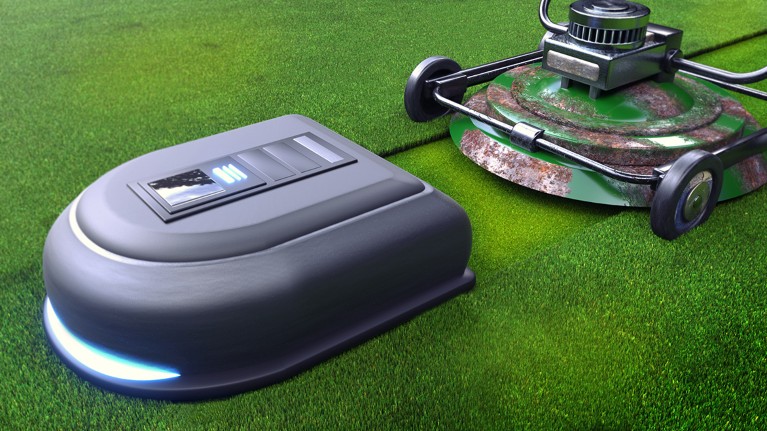I’d told Dad to wait to do his biweekly Saturday mowing because I was coming over, so of course, he was a quarter of the way through the job as my car parked itself. I sighed. He was so predictable.
I waited for him by the open hatch of my car. He stopped mowing and approached, his dark skin sheened by sweat, his silver hair drenched beneath his cap.
“The hat looks good,” I said. I’d suggested gifting him one that would send me biometric readings, but he’d insisted on basic cloth.
He grunted. “My favourite daughter bought it for me. Couldn’t let it go to waste.”
I was his only child. “I brought you something for your birthday. Not a hat,” I added, seeing the question posed on his lips. I threw back the towel that covered the object on the floor. “Ta-da!”
He regarded the gift with a blank face. “What is it?”
I set the small, wheeled black box on the pavement. “An automatic mower, the newest model! See, I already —”
“There’s nowhere for the clippings to go.”
Read more science fiction from Nature Futures
“It has a concealed balloon that fills up as it works,” I said with practised patience. “The bot senses when the biodegradable bag is full and will automatically eject it at a set location and load a new one. I’ve already input an entire map of the whole yard, Dad. It’ll start at the usual time you mow in the summer.” Which was right now. Dad had probably begun early, despite my plea, because he wanted the yard to look ‘nice’ for me. He’d never cared much about how the interior of the house looked — nor had Mom, when she was alive — but the yard was his point of pride, his domain. That’s why I knew he’d resist this change with every ounce of his being.
It’s also why I knew that if I didn’t buy an automatic mower for him, I’d come over one day and find him collapsed in the yard. Again. And this time they might not be able to save him at the hospital.
“This thing is too expensive.” He shook his head. “I don’t even want to think of what it cost. You need to take it back.”
“No, I want you to try it out first. Watch.” Before he could argue further, I used my watch to initiate the mower. Lights flickered on across the carapace.
“Greetings! I’m ready to get to work,” said the bot. I thought its voice was chipper without being annoying, but Dad’s glower showed he was not won over. “I detect that some mowing has already been completed. I’ll continue.” With a happy chime, it set off.
At Dad’s raised eyebrow, I answered, “Its sensors look for partial mowing work, obstacles, all that stuff. If the weather turns bad mid-job, it’ll go back to base and ask to reschedule the remaining duty later.”
“I see.” We watched the mower for a few minutes. It cut with fast efficiency. “I like mowing.” The soft words would’ve been lost beneath the roar of an older mower like the one parked nearby; that thing was practically twentieth-century and required a lot of physical exertion on his part. I’d remembered it being in the garage almost my entire life.
I released a long breath. “I know you do, Dad. But you’re getting older. You already had one scare while mowing. You know how long and hot these summers are now — climate change is no joke. It’s killing a lot of people. I don’t want you to join those statistics.”
Dad said nothing for a few minutes. “It’s mowing in straight lines like I do.”
“Yeah. I told it to.” That earned me a sidelong glance and a quirk of a smile. “How was your book club this week?”
We continued to talk about our lives in recent days as the mower finished up. Dad frowned as the bot parked itself in the garage, adjacent to where the old mower would go. “It did an OK job,” he said, somewhat grudgingly.
“The bot’s AI will learn to operate better. We can provide feedback to help.” I tried not to look at the old mower, and I sure didn’t mention it. I didn’t want Dad to become defensive again. “I’ll send you the manual so you can get the app set up, too, and take things from here. I’ll keep monitoring, as well, though.” I wanted him to know I’d make sure the bot was filling those clipping bags. “I gotta go now.”
“I still think you spent too much money,” he muttered, giving me a sweaty hug.
“I love you, too, Dad,” I said, laughing as I got into my car.
I let it drive just past the hedges then forced a manual stop. I got out to stand concealed in the shade.
Just as I expected, Dad revved up his old mower and went back to where he left off. He moved quickly since the machine didn’t really need to cut much grass — it was a touch-up, more like he was taking the mower on a walk. That meant he’d be done fast and wouldn’t exert himself nearly as much.
Oh, I’d ask Dad soon if he’d tweaked the AI on the bot to improve its work, but that could wait. Dad loved his biweekly Saturday summer mowing. Now he could still feel like he was doing it, but in a much milder form.
I waited until he was done before I left. In my last glance back, he was fanning himself with the hat that’d been given to him by his favourite daughter.


 Family get-together by Beth Cato
Family get-together by Beth Cato
 A light in the garden by Beth Cato
A light in the garden by Beth Cato
 The right cornbread by Beth Cato
The right cornbread by Beth Cato
 Welcome home by Beth Cato
Welcome home by Beth Cato
 Shared pain by Beth Cato
Shared pain by Beth Cato
 What friends are for by Beth Cato
What friends are for by Beth Cato
 Apocalypse playlist by Beth Cato
Apocalypse playlist by Beth Cato
 Sometimes you end up where you are by Beth Cato
Sometimes you end up where you are by Beth Cato
 The wind knows all by Beth Cato
The wind knows all by Beth Cato
 A picture is worth by Beth Cato
A picture is worth by Beth Cato
 The 133rd Live Podcast of the Gourmando Resistance by Beth Cato
The 133rd Live Podcast of the Gourmando Resistance by Beth Cato
 Powers of observation by Bet Cato
Powers of observation by Bet Cato
 Excerpts from the 100-day food diary of Angela Meyer by Beth Cato
Excerpts from the 100-day food diary of Angela Meyer by Beth Cato
 The human is late to feed the cat by Beth Cato
The human is late to feed the cat by Beth Cato
 Bread of life by Beth Cato
Bread of life by Beth Cato
 Post-apocalyptic conversations with a sidewalk by Beth Cato
Post-apocalyptic conversations with a sidewalk by Beth Cato
 Canopy of skulls by Beth Cato
Canopy of skulls by Beth Cato
 Three possible muses by Matt Tighe
Three possible muses by Matt Tighe
 These monkeys make no sense by Shahar Dubiner
These monkeys make no sense by Shahar Dubiner
 The real time-travel paradox was the friends we made along the way by Rodrigo Culagovski
The real time-travel paradox was the friends we made along the way by Rodrigo Culagovski
 The warfighter by Timothy Quinn
The warfighter by Timothy Quinn
 Plutopalooza by Gretchen Tessmer
Plutopalooza by Gretchen Tessmer


